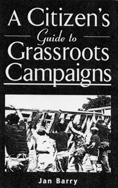 |
Practical Advice on OrganizingBy David Cline (Reviewer)A Citizen's Guide to Grassroots Campaigns
Jan Barry is one of the unsung heroes of the Vietnam war era. Born in Ithaca, New York during World War II, his childhood ambition was to attend West Point. He joined the Army in 1962 and volunteered for Vietnam where he was a radio/navigation operator for planes supplying Special Forces units. After his return, he received an appointment to West Point, the first cadet there who had already served in Vietnam.
He soon dropped out of West Point and got out of the Army. In April 1967, he attended an antiwar demonstration in New York City and marched with a contingent of Veterans for Peace in Vietnam. Someone pulled out a banner saying Vietnam Veterans Against the War that he and five others carried. That was the beginning of VVAW. Soon a meeting was held and the organization was officially founded. Jan was elected the national president and devoted the next four years to these duties. During that time, VVAW grew to a membership of over fifteen thousand and became a leading force in the antiwar movement and an advocate for veterans' rights. A prolific poet, he helped start 1st Casualty Press, an independent publishing house that printed several books of poems and short stories by Vietnam vets. He also helped form the first "rap groups" to deal with Post Vietnam Syndrome (now known as PTSD), enlisting the assistance of noted psychiatrists Robert J. Lifton, Chaim Shatan and others. Over the years he has remained involved in many progressive causes ranging from defense of the environment to efforts to stop the nuclear arms race. Today he lives in northern New Jersey and works as a journalist for The Record. He has been married for thirty years, and together with his wife Paula, has raised two sons. Jan has now written "A Citizen's Guide to Grassroots Campaigns," drawing on his years of experience and the work of other New Jersey grassroots activists. There are chapters examining efforts to rebuild urban neighborhoods, save natural resources from developers, form self-help groups, and organize global civic action. Other sections cover organizing and conducting campaigns as well as dealing with politicians and the news media. This book will benefit all people working for progressive social change, from longtime activists to those just getting involved. The book is written in down-to-earth language and is full of valuable insights on how to go out and actually organize for change instead of just talking about it. If you are looking for a radical manifesto, look elsewhere, but if you want practical advice on organizing, read this book.
|


 But he came home from Vietnam disillusioned with the escalating U.S. military involvement there. While in country, he got what he called "an education in colonial military policy." He witnessed Buddhist demonstrations in Nha Trang and the U.S.-supported Saigon regime's response of "tanks and machine guns and barbed wire all over the country." He concluded that he was "being had."
But he came home from Vietnam disillusioned with the escalating U.S. military involvement there. While in country, he got what he called "an education in colonial military policy." He witnessed Buddhist demonstrations in Nha Trang and the U.S.-supported Saigon regime's response of "tanks and machine guns and barbed wire all over the country." He concluded that he was "being had."